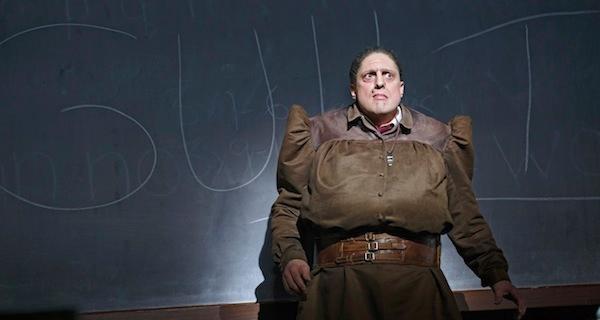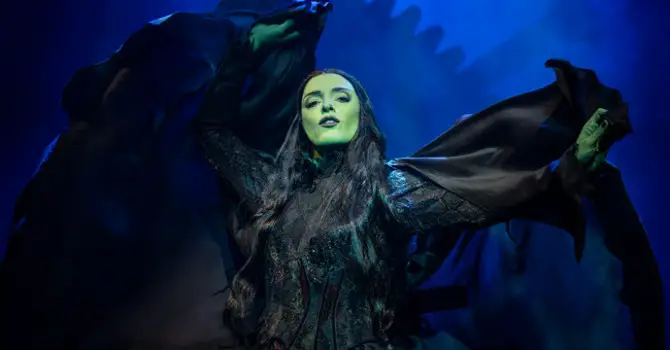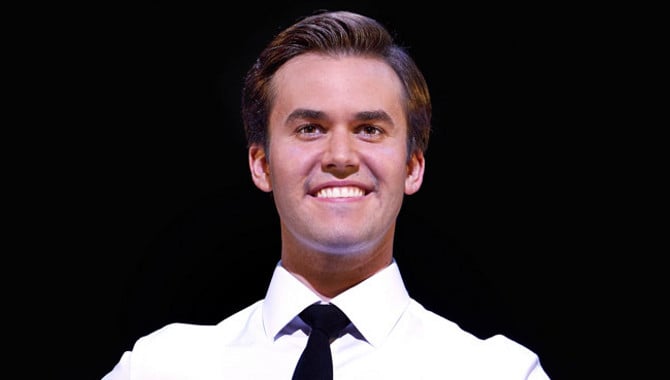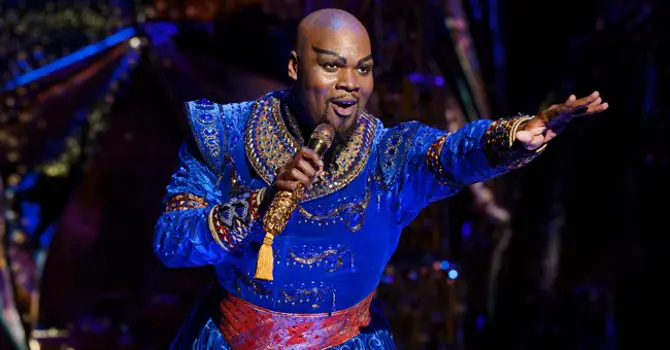Take it from Christopher Sieber: it’s O.K. to scare children. As the evil headmistress Agatha Trunchbull in Matilda the Musical at the Shubert Theatre, he’s an expert. The Trunchbull believes children are maggots (not to mention gangsters, toads, and cockroaches); she frightens them for her own fascistic delight and threatens them with the ultimate penalty for bad behavior: time in the chokey, a horrible place made of spikes, wood, and nails.
“Kids get the darkness,” said Sieber. “They think it’s funny. Trunchbull will do something cruel and hateful and some of the kids in the audience will be howling with laughter. They like being scared. When I go into the audience, they lean away from me, but it’s like going to a haunted house. They love it. It’s thrilling.”


Christopher Sieber thrills kids as Trunchbull in the Broadway smash Matilda. Photo: Joan Marcus
Based on the 1988 book by Roald Dahl, Matilda is about a steely five-year-old genius, Matilda Wormwood, whose lame-brained parents scorn her love of books (her tastes run from Dostoyevsky to Dr. Seuss). Her father (Rick Holmes), a scheming used-card dealer without any smarts, and mother (Amy Spanger), who is consumed with salsa and ballroom dancing, dispatch Matilda to a prison-like school where older kids warn her “there’s no escaping tragedy.”
But Matilda cannot be intimidated. Played by a rotating cast of four young actors (Mattea Conforti, Rileigh McDonald, Mimi Ryder, and Alexandra Vlachos), she is imaginative, wise, and insightful—an adult in a tiny body. Yet, she is a little girl, who, deprived of love by her abominable parents, finds it with her tender-hearted teacher, Miss Honey (the heartbreaking Allison Case)—a longtime victim of the Trunchbull.
The result is a macabre and riveting musical that embodies one of Dahl’s central themes: adults are the natural enemies of children. The theme is reinforced in the sharply written and compassionate book (which earned a Tony Award for Dennis Kelly) and the memorable score by Tim Minchin, whose songs (“When I Grow Up,” “Naughty,” and “Revolting Children”) give life to the dreams of children—and the rebellion lurking within them.
The kids need to rebel because of the Trunchbull, a paranoid, all-powerful bully clad in a brown dress, severe hair bun, tasseled knee socks, and raccoon-rimmed eyes—an unsettling vision that Charles Addams might have imagined. A former Olympic hammer thrower—in a gym scene, she wears a worn-out, decades-old Olympic singlet—she brandishes her success in following the rules of her sport as a weapon against the children.
“She holds onto the one thing that she accomplished,” Sieber said. “It’s like ‘Listen to me, I’m a world-champion Olympian. Don’t forget that. I wear that badge on my chest.’ ”
The darkness of Matilda is balanced by the ultimate hope of overcoming evil.
“The show is for everybody,” Sieber said. “It’s so heartwarming. That number, ‘When I Grow Up,’ is everything you hope life will be. Kids identify with kids and the teachers they have now. There’s a touch of Trunchbull in teachers.”
Indeed, he said, his first grade teacher in rural Minnesota was decidedly Trunchbullian.
“She dressed like her, except all in black,” he said. “She had those big Minnie Mouse orthopedic shoes, a skirt, no makeup, and hair in a bun with pins. She would hit you in the back of your head, tape your mouth shut, and smack you with a ruler. When I first saw Trunchbull’s costume, I said, ‘That’s Miss Erickson!’ ”



-fotor-20230728152812.jpg)

